Yes, you can get gonorrhea without having penetrative sex. Certain non-penetrative activities, like mutual masturbation, can transmit the infection. Sharing unclean sex toys also increases your risk. While oral sex is a known way to spread gonorrhea, casual contacts like kissing or sharing food don't carry the infection. It's important to be aware that untreated gonorrhea can lead to severe health issues, including infertility. Regular testing is essential, especially if you've had potential exposure. If you're curious about the various transmission methods and risk factors, there's more valuable information to explore.
Key Takeaways
- Gonorrhea primarily spreads through sexual intercourse, including oral sex, but can also be transmitted through non-penetrative genital contact.
- Sharing unclean sex toys can facilitate the transmission of gonorrhea without sexual penetration.
- Kissing or casual contact does not transmit gonorrhea, highlighting the need for direct sexual contact for infection.
- Vertical transmission from mother to child during childbirth is a rare but possible nonsexual transmission route.
- Asymptomatic individuals can still spread gonorrhea, emphasizing the importance of regular STI testing regardless of sexual activity.
Overview of Gonorrhea

Gonorrhea, a prevalent sexually transmitted infection (STI), is caused by the bacterium Neisseria gonorrhoeae. This infection primarily affects the mucous membranes of the reproductive tract, mouth, and throat.
With around 1 million new gonorrhea infections occurring annually in the U.S. alone, it's vital to understand its implications. Many people, especially those assigned female at birth, may not show symptoms for weeks, making early detection challenging.
If untreated, gonorrhea can lead to serious health complications, including infertility and chronic pain. While it's primarily transmitted through sexual contact, nonsexual transmission is rare but can happen during childbirth, posing risks to infants.
Recognizing these factors can help you take proactive measures for your health.
Modes of Transmission

When you think about gonorrhea transmission, it's essential to take into account more than just sexual intercourse.
Oral sex and sharing unclean sex toys can also spread the infection, highlighting the importance of safe practices.
Additionally, non-sexual transmission can occur during childbirth, which is another risk factor to be aware of.
Non-Sexual Transmission Risks
Though gonorrhea is primarily transmitted through sexual activity, there are rare instances where non-sexual transmission can occur.
For example, gonorrhea is spread through non-penetrative genital contact, even if full sexual intercourse doesn't happen. If you share uncleaned sex toys that have come into contact with infected fluids, you increase your risk of infection.
Additionally, infants can contract gonorrhea during delivery from an infected mother, leading to potential eye infections.
However, it's essential to recognize that casual contact, such as kissing or sharing food, doesn't spread gonorrhea. The emphasis remains on the necessity of sexual activity for most transmissions, highlighting the rarity of non-sexual transmission risks.
Stay informed and practice safe behaviors to protect yourself.
Oral Sex Transmission
Non-sexual transmission risks are relatively rare, but oral sex presents a considerable pathway for gonorrhea spread. Engaging in oral sex with an infected partner can lead to transmission, as the bacteria may infect the throat.
Specific acts like fellatio and cunnilingus are known routes for gonorrhea transmission. Often, oral gonorrhea shows no noticeable symptoms, sometimes mimicking a sore throat, which makes testing essential, especially if you have multiple partners.
To protect yourself, use barriers like dental dams during oral sex, as they can considerably reduce the risk of transmitting gonorrhea and other STIs. Remember, condoms can also help, but they're less effective in preventing oral transmission compared to dental dams.
Stay informed and prioritize your sexual health.
Shared Sex Toys
Sharing sex toys can considerably increase your risk of gonorrhea transmission if they're not properly cleaned. When unclean toys come into contact with infected fluids, you could be exposing yourself to the infection. Even manual stimulation can spread gonorrhea if fingers that contacted infected areas are used elsewhere.
| Risk Factor | Recommendations |
|---|---|
| Sharing unclean toys | Avoid altogether |
| Manual stimulation | Wash hands thoroughly |
| Inconsistent cleaning | Regularly disinfect toys |
| No barrier protection | Use condoms on toys |
| Multiple partners | Limit use to one partner |
To reduce the risk of gonorrhea and other sexually transmitted infections (STIs), regularly disinfect your toys and prioritize safe practices.
Non-Penetrative Activities

You might think non-penetrative sexual activities are safe, but they can still expose you to gonorrhea.
Any genital contact, like rubbing or grinding, can transmit the infection if infected fluids are involved.
Additionally, sharing unclean sex toys can also increase your risk, making it essential to prioritize hygiene.
Non-Penetrative Genital Contact
Although many people associate gonorrhea transmission with penetrative sex, it's important to recognize that non-penetrative genital contact can also pose a significant risk.
Activities like mutual masturbation or rubbing genitals together can facilitate the spread of gonorrhea, especially if one partner is infected. The bacteria can be present in sexual fluids that come into contact with mucous membranes.
Keep in mind that asymptomatic individuals can unknowingly transmit the infection during these activities, increasing the risk.
Regular STI testing is essential for sexually active individuals, as it helps identify infections before they spread.
Staying informed about these risks can empower you to make safer choices in your sexual experiences.
Sharing Contaminated Sex Toys
When sex toys are shared without proper cleaning, they can become a source of gonorrhea transmission.
Sharing unclean sex toys, like dildos or butt plugs, increases the risk of infection if they touch infected bodily fluids. Gonorrhea bacteria can linger on surfaces, making hygiene essential, especially during non-penetrative activities.
To protect yourself and your partners, remember to:
- Use condoms on sex toys to create a barrier.
- Clean toys thoroughly between uses to avoid contamination.
- Get regular STI testing, as many may not show symptoms.
Oral Gonorrhea Explained
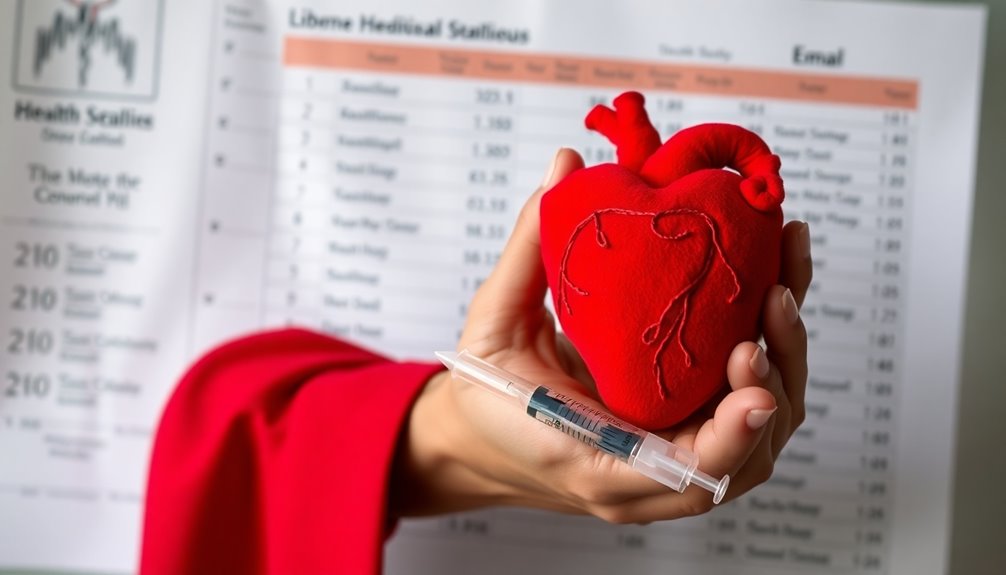
How does oral gonorrhea occur, and what should you know about it?
Oral gonorrhea is a type of gonorrhea infection that specifically affects your throat. It's mainly transmitted through oral sex with an infected partner.
You might experience symptoms like a sore throat, difficulty swallowing, or redness in your throat, but many people don't show any signs at all.
The bacterium Neisseria gonorrhoeae can infect your throat simply through oral sex—no penetration required.
That's why regular testing for STIs, including oral gonorrhea, is essential if you're sexually active, especially if you engage in oral sex.
To reduce your risk, consider using dental dams during oral sex, which can help prevent transmission of this infection.
Risk Factors for Infection

Understanding the risk factors for gonorrhea infection is essential, especially since many people may not realize they're at risk.
While gonorrhea is primarily transmitted through sexual contact, several factors can increase your chances of contracting an STI:
- Asymptomatic individuals can unknowingly spread the infection through uninfected fluids.
- Sharing unclean sex toys can lead to transmission, even without penetrative sex.
- Infants can contract gonorrhea during childbirth if the mother is infected.
It's important to note that casual contact, such as kissing or sharing food, doesn't pose a risk.
Symptoms to Watch For
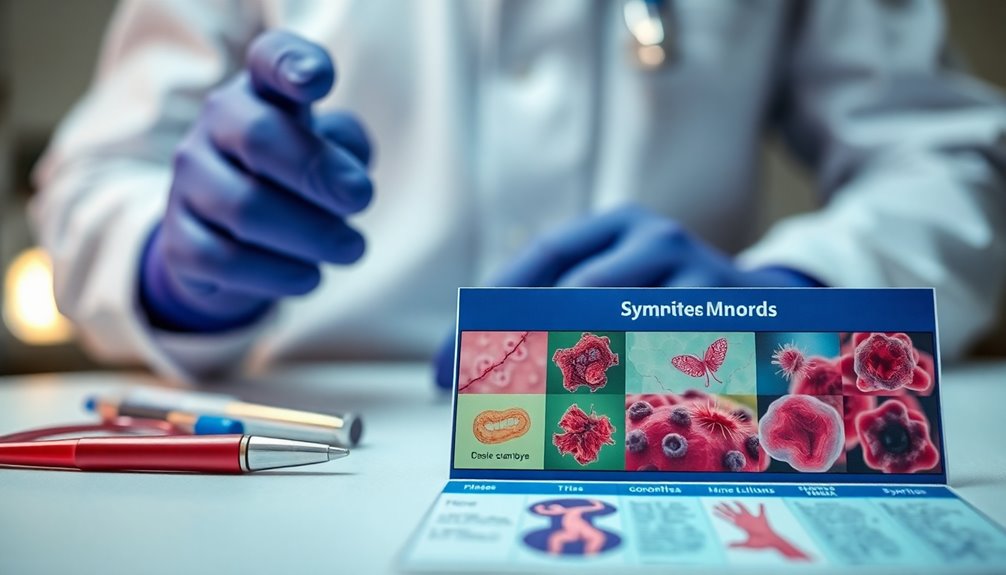
Although gonorrhea often goes unnoticed, being aware of its symptoms is vital for early detection and treatment. You might experience painful urination, unusual discharge, or pelvic pain, which can appear 1 day to 1 week after potential exposure.
If you have oral gonorrhea, it can mimic a sore throat, causing discomfort and difficulty swallowing. Women may notice intermenstrual bleeding or abdominal pain, while men might feel testicular pain or swelling.
Since these symptoms can be subtle or absent, regular STI tests are important for sexually active individuals. If you suspect you might've been exposed, getting tested is a proactive step to guarantee your health and prevent complications.
Stay informed and vigilant about your body.
Testing and Diagnosis

Getting tested for gonorrhea is an important next step if you're experiencing symptoms or think you might've been exposed.
Regular testing is essential, especially for sexually active individuals, since the infection often shows no symptoms. Diagnosis typically involves urine tests or swabs from infected areas, with nucleic acid amplification tests (NAATs) being the most reliable method.
- Wait at least two weeks post-exposure for accurate results.
- Seek confidential testing from healthcare providers.
- Early detection can prevent serious health problems.
Treatment Options Available
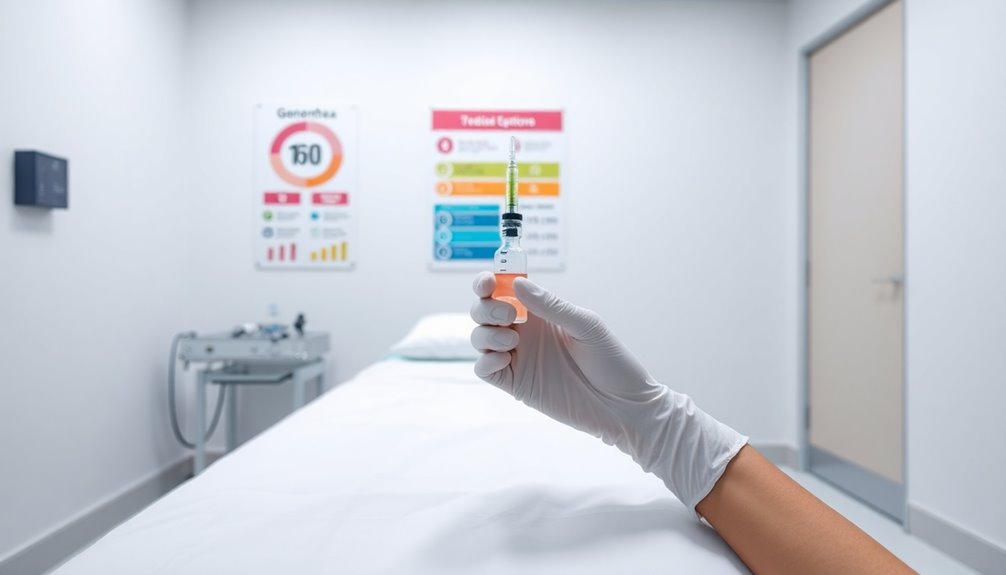
Effective treatment for gonorrhea is critical for your health and well-being. The primary approach involves antibiotics, specifically a dual therapy using ceftriaxone and azithromycin, which effectively eradicates the infection.
It's important to have follow-up testing two weeks after treatment to confirm the infection's clearance. Simultaneously treating your sexual partners is necessary to prevent reinfection, as no immunity develops post-treatment.
To guarantee the infection is fully resolved, wait at least seven days after completing your antibiotics before engaging in unprotected sex.
Fortunately, treatment for gonorrhea is typically effective, allowing you to return to normal activities within one to two weeks. However, ongoing health measures remain significant to avoid future infections.
Prevention Strategies
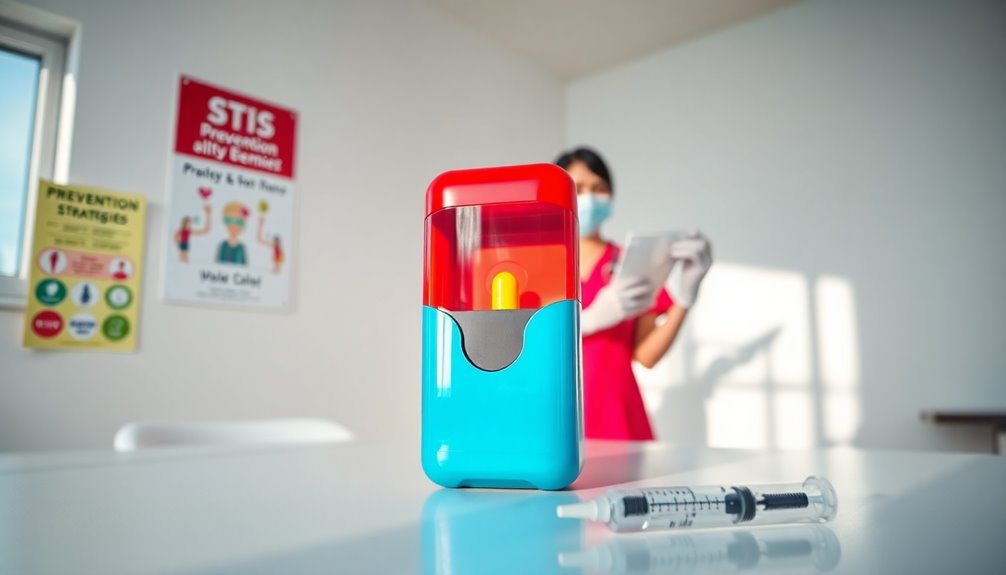
After completing your treatment for gonorrhea, it's important to focus on prevention strategies to protect yourself and your partners from future infections.
To prevent gonorrhea and other STIs, consider these key practices:
- Use condoms every time you engage in sexual activity—this greatly reduces the risk of transmission.
- Communicate openly with your partners about STI testing and sexual health. It's essential to be on the same page.
- Get tested regularly, especially if you're under 25 or have multiple partners; early detection helps prevent complications.
Importance of Regular Screenings
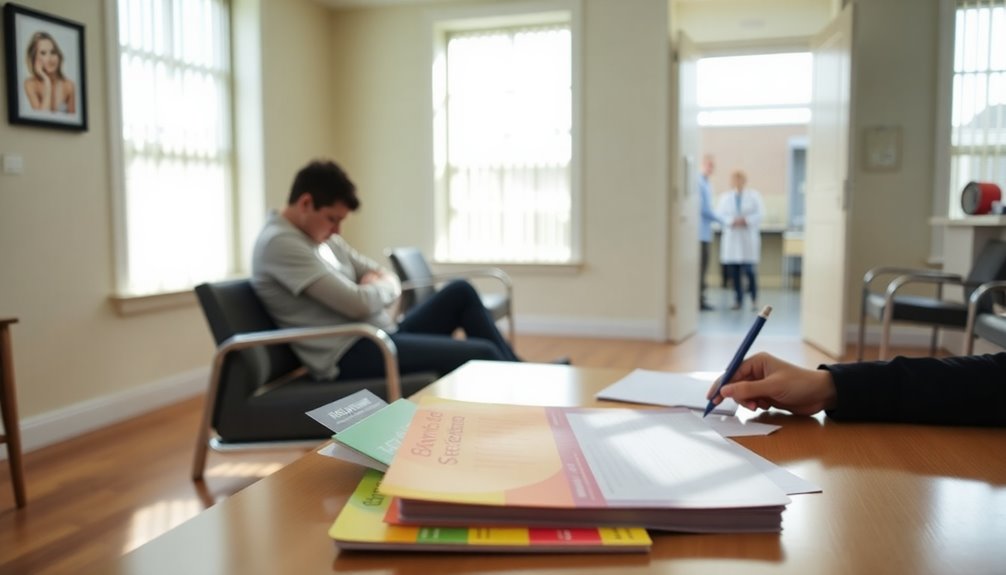
Regular screenings for gonorrhea are essential because many people don't show symptoms, making it easy to overlook an infection. The CDC recommends annual testing for sexually active individuals under 25 and those with multiple partners. Regular screenings help guarantee early detection, preventing serious health issues like infertility and chronic pain that can arise from untreated gonorrhea.
| Screening Frequency | Recommended Age Group | Testing Method |
|---|---|---|
| Annually | Under 25 | Urine tests |
| Annually | Multiple partners | Swabs from infected areas |
| Every 6 months | History of STIs | Urine tests |
| As needed | Symptoms present | Swabs or urine tests |
| Regularly | All sexually active people | Combination of methods |
Frequently Asked Questions
Can Gonorrhoea Be Transmitted Non Sexually?
Gonorrhea isn't typically transmitted non-sexually. It primarily spreads through sexual contact, so casual interactions like kissing or sharing food won't put you at risk.
However, if you share unclean sex toys with an infected person, you could potentially expose yourself to the bacteria.
Remember, asymptomatic individuals might unknowingly transmit the infection during sexual activities, but non-sexual routes aren't a significant concern for gonorrhea transmission.
Stay informed and practice safe habits!
How Did I Get Gonorrhea if I Didn't Cheat?
Imagine a game of tag, where the infection can sneak in from unexpected places.
If you've contracted gonorrhea without cheating, it's possible you were exposed through oral sex, sharing unclean toys, or even manual contact with infected fluids.
The bacteria can linger in the throat or rectum, making it easy to spread without obvious signs.
Sometimes, it's not just about direct intercourse; it's about the connections you make.
How Did I Get Gonorrhea if My Partner Doesn't Have It?
It's possible to contract gonorrhea even if your partner doesn't show symptoms or test positive. Asymptomatic cases are common, meaning your partner might carry the bacteria without knowing.
You could've also been exposed via oral sex or shared unclean sex toys. If either of you'd sexual contact with someone else previously, that could be the source.
Regular STI testing is vital for both of you, as infections can remain undetected.
Can Gonorrhea Go Naturally?
Gonorrhea can't go away naturally. If you've got it, the bacteria will stick around unless you get treated with antibiotics.
Ignoring it might lead to serious health issues like infertility and chronic pain. You mightn't have any symptoms, which can make it easy to overlook.
Regular testing is essential, so if you suspect you have gonorrhea, don't wait. Seek medical help to get the treatment you need.
Conclusion
In summary, while gonorrhea is primarily transmitted through sexual contact, it's possible to get infected through non-penetrative activities. For example, if you share a sex toy that hasn't been properly cleaned, you could contract the infection. That's why it's essential to stay informed and practice safe habits. Regular screenings and open communication with partners can help prevent the spread of gonorrhea and keep your sexual health in check. Don't underestimate the importance of taking precautions!










